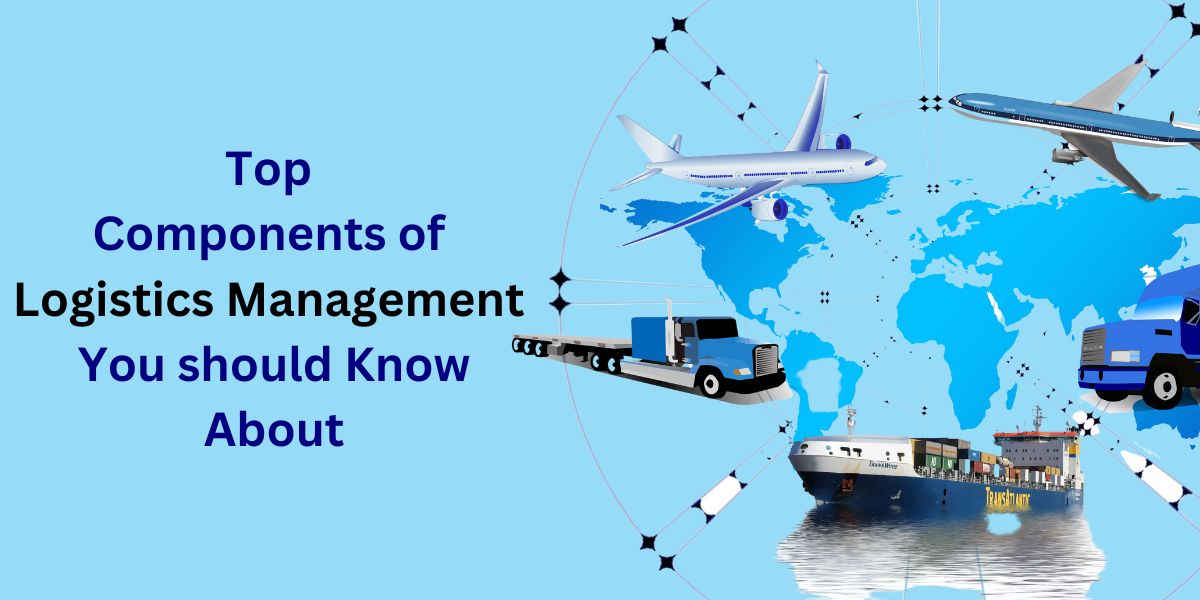Think of logistics management as the force behind getting your desired things to you right when you want them. The top components of logistics management ensure products arrive safely, stores always have what you need, and delivery happens super smoothly.
This interesting system keeps your products stocked, and your deliveries on time, and even predicts what you’ll want next. So, whether it’s your gadgets or goodies, logistics management is the key to the current and future packaging and delivery market.
Effective logistics management can significantly impact a business’s bottom line. Companies that implement robust logistics strategies often experience up to a 20-50% reduction in overall operational costs while simultaneously improving delivery performance.
What is Logistics management?
Logistics management involves planning, implementing, and controlling the efficient flow of goods, services, and information from the point of origin to the point of consumption to meet customer requirements.
It holds significant importance within the broader context of the supply chain. It encompasses various tasks like orchestrating and overseeing the movement of goods from their source to their final destination.
This role is a pivotal aspect of supply chain management (SCM), which encompasses activities such as product packaging, handling of materials, storage, managing inventory, and other related services. Recognizing the essential elements of logistics management is crucial to ensuring the seamless operation of all activities within the supply chain.
In the present landscape, a well-devised strategy for logistics management has gained heightened significance due to the increasing complexity of transportation. The ability to maintain a clear and continuous flow of communication and goods throughout the entire process can offer a holistic view of operations, contributing to an enhanced customer experience.
Objective of Logistics management
The primary goal of formulating a robust logistics management strategy is to elevate the customer experience while also attaining the objectives set by the organization.
In the contemporary business landscape, it has become essential for companies to allocate resources towards technology that facilitates logistics management. This strategic investment is pivotal for gaining a competitive edge within the market.
An integral facet of this approach involves comprehending the objectives of logistics, as it plays a vital role in establishing transparency across all operations within the supply chain.
1. Enhancing Supply Chain Efficiency
Logistic managers are dedicated to refining operations and resolving bottlenecks within the supply chain. Through the optimization of processes and improved coordination among various stakeholders, their objective is to ensure the punctual delivery of products and services.
2. Expenditure Reduction
Exercising control over costs is a foundational aspiration within logistic management. By employing effective inventory management methods, minimizing transportation expenses through route optimization, and skillfully negotiating favorable agreements with suppliers and service providers, logistic managers strive to curtail overall operational expenditures.
3. Elevating Customer Contentment
Meeting the expectations of customers stands as a pivotal determinant of business triumph. Logistic managers concentrate on the punctual provision of products or services with minimal discrepancies or delays. They oversee proper packaging, accurate order completion, and efficient communication throughout the logistical process to amplify customer satisfaction.
4. Effective Inventory Oversight
The adept management of inventory holds great significance in upholding suitable stock levels while evading surplus stocks or stockouts. Logistic managers endeavor to strike equilibrium between the precision of demand forecasting and the costs involved in maintaining inventory, thus optimizing inventory levels across the entire supply chain.
5. Optimization of Transportation
The logistics domain relies heavily on transportation networks to efficiently transport goods between locations. Logistic managers toil towards the optimization of transportation routes, modes (such as roadways and railways), selection of carriers (including third-party logistics providers), and strategies for consolidating shipments, all aimed at minimizing transit times and associated expenses.
6. Risk Management
Logistic managers proactively identify potential risks that could disrupt the seamless functioning of the supply chain, encompassing events like natural disasters or supplier disruptions. They develop well-devised contingency plans to effectively mitigate these risks, employing measures such as alternative suppliers, contingency transportation routes, or appropriate insurance coverage.
Major Components of Logistics Management
Efficiently organizing operations is really important to make sure that logistics systems run cost-effectively. Because of this, it’s become crucial for business leaders to understand the main components of logistics. This helps them improve how things are done and make sure customers are happy.
Here are some major components of Logistics Management,
1. Demand Planning
Understanding all aspects of logistics is crucial to maintaining a balance between what’s needed and what’s available. Logistics management ensures that activities are well-organized so that the movement of products isn’t disrupted. This streamlined process helps companies gauge and predict the demand for goods and services.
Planning is a vital part of the supply chain that can prevent shortages or incorrect product supply. Likewise, the aim is to analyze historical data, statistical predictions, and the entire lifespan of a product to stay ahead of changes in the market.
2. Storage and Material Handling
In today’s unpredictable market, there must be extra items available to meet unexpected consumer needs. Properly storing and safeguarding goods or resources is important.
Warehouse management systems (WMS) play a crucial role in ensuring that items can be stored, moved, and transported efficiently. WMS enhances storage capacity and equipment, while also reducing distribution and transportation costs. This contributes to the smooth functioning of supply chain processes.
3. Inventory Management
Companies regularly review inventory levels to track the movement of items in and out of a warehouse. They determine how much stock to order, when to order it, and where to store it.
By using effective inventory management, companies can avoid having too much or too little product on hand. It also predicts consumer demand, which helps with better order planning and organization.
Strategic planning and real-time inventory management are among the most crucial aspects of logistics.
4. Fleet Management
Effectively managing and monitoring commercial vehicles is a vital logistics component. This involves tasks such as optimizing fleet maintenance, asset utilization, and cost management.
Businesses are now investing in fleet management software to enhance the efficiency of their fleets and drivers. As a result, fleet management systems provide comprehensive fleet-related information through predictive analytics and dependable reporting.
5. Transportation Management
Transportation management is the cornerstone of logistics. It arranges and supports the movement of goods to their final destination, whether by freight trains, road vehicles, ships, or other methods. Optimized transportation ensures that products reach customers on time.
It also handles the return movement of goods. Investing in a transportation management system can contribute to a company’s success. This improves customer service by ensuring timely or even early deliveries.
6. Information and Control
Adopting advanced technologies is seen as the future of logistics. Insights driven through advanced technologies are top components of Logistics management that help companies manage supply chains more efficiently. For eg, data, software, and processes. This includes predicting demand and transit schedules, enabling businesses to make more cost-effective choices.
Maintaining the flow of information is vital for gaining relevant insights and accurately managing demand. Having the right knowledge and control over logistical operations is crucial for successfully executing each of these components.
To conclude
In a nutshell, logistics management is like the behind-the-scenes superhero of getting things from where they’re made to where they’re needed. Imagine a puzzle where every piece needs to fit perfectly for everything to work smoothly.
Here are the key Takeaways:
- Balancing Supply and Demand: Logistics makes sure we have the right amount of stuff at the right time. This helps avoid shortages or having too much of something.
- Safekeeping and Moving Stuff: Think of it as carefully storing and moving things so they don’t get damaged. Special systems help keep track of where everything is.
- Keeping an Eye on Inventory: Checking what we have and how much we need is important. It’s like knowing when to buy more of a popular toy so it doesn’t run out.
- Managing Vehicles: Just like a game, managing vehicles is important. Making sure they’re in good shape and used efficiently helps things run smoothly.
- Getting Things to You: The most exciting part is making sure things get to you on time. This involves choosing the best way to transport stuff, whether it’s by truck, train, or ship.
- Using Smart Technology: Technology is like a magic tool. It helps us plan better, predict what we’ll need, and make things faster and cheaper











